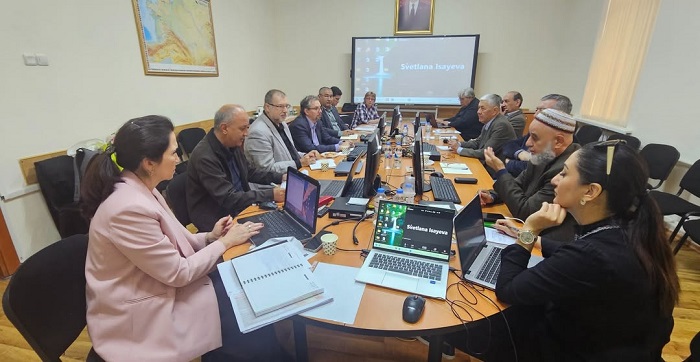 A round table on land use issues was held at the National Institute of Deserts, Flora and Fauna. The meeting was attended by members of the working group on the neutral balance of land degradation, established under the Scientific and Public Council on Desertification, the Neutral Turkmenistan newspaper reports.
A round table on land use issues was held at the National Institute of Deserts, Flora and Fauna. The meeting was attended by members of the working group on the neutral balance of land degradation, established under the Scientific and Public Council on Desertification, the Neutral Turkmenistan newspaper reports.
The event was organized within the framework of the Aral Sea Project implemented in Turkmenistan with the participation of the ministry of environment protection, the United Nations Development Program and the Global Environment Facility. The eco-association “Tebigy kuwwat” acted as a co-organizer.
The meeting was attended by experts and scientists in the field of agriculture and desert science. The issues of achieving a neutral balance of land degradation, which implies a balance between intensive land use and measures to restore their agroecological sustainability, were discussed.
It was emphasized that science-based agriculture is part of the National Action Program to Combat Desertification. The importance of a new global trend of “zero degradation” for strengthening the factors of stable agriculture was noted.
National Coordinator of the project Rustem Nuriyev said that the project contributes to the implementation of the National Program for the Aral Sea for 2021-2025, as well as the promotion of priorities in the field of land and water resources management and environmental protection in the context of climate change. He also emphasized the need to prevent land degradation and combat desertification, which is reflected in the “National Program of Socio-economic Development of Turkmenistan for 2011-2030.”
These land use initiatives increases the potential of protected natural areas and contributes to mitigating the Aral Sea crisis. The compliance of the project with the priorities outlined in the bilateral environmental documents signed with the Russian Federation in January 2023 was noted. The action plan envisages scientific exchange, joint research, the definition of national indicators for monitoring the state of land, as well as planning for sustainable land use.
During the roundtable, participants discussed factors contributing to land degradation, including erosion, salinization, deflation, and desertification. These factors negatively impact productivity and environmental functions, leading to increased wastelands, decreased yields, and an elevated risk of dust storms.
The possibility of incorporating the concept of “maintaining static in the process of soil degradation” within Turkmenistan’s national documents was explored. Participants shared expertise and knowledge to achieve this balance and develop a comprehensive plan, emphasizing intersectoral and regional cooperation.
Gozel Atamuradova, head of the Aral Sea Project, advocated for the inclusion of indicators to curb land degradation in legislative acts, including the National Forest Program. Since the program’s implementation, spontaneous tree planting has evolved into a targeted climate change adaptation measure. Within the framework of the program, an inventory of forests, preparation of normative legal acts, surveys on the cultivation of woody plants and afforestation were carried out.
Turkmenistan has adopted more than fifty environmental laws and regulations, as well as signed up to thirty conventions, regional and international agreements in the field of nature protection. These measures contribute to balanced agricultural production and rational use of arable land and pastures.
The meeting resulted in recommendations on strengthening scientific exchange within the framework of the Aral Sea Project, including with scientists from the Institute of Geography of the Russian Academy of Sciences.///nCa, 18 December 2024